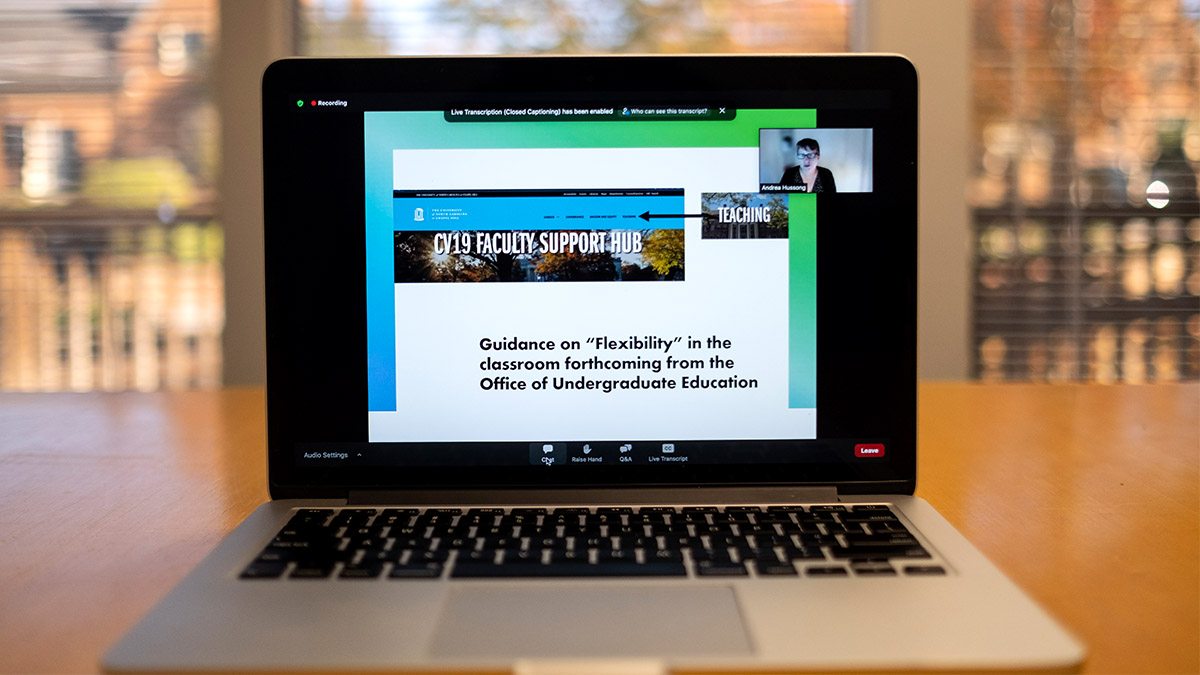Faculty, staff say they are struggling
During the Nov. 15 Mental Health Summit, faculty and staff representatives explained how factors including the pandemic, increased demands and a decline in resiliency have affected their colleagues and students.

Faculty and staff representatives shared their thoughts on students’ well-being and managing their own mental health during a session as part of the Nov. 15 daylong virtual Mental Health Summit.
They reported on a survey sent to faculty and staff through listservs and shared during the Nov. 5 general faculty meeting. More than 940 people responded between Nov. 3-8, including 301 tenure-track, instructional and fixed-term faculty and 640 staff from across the University.
Open to the Carolina community, the summit brought together students, faculty, staff and parents to discuss the impact of the pandemic on mental health at the University and nationally and to continue the work of the 2019 Mental Health Task Force. More than 750 people attended, including 157 faculty, 502 staff and 91 students.
Hearing all of the voices — students, faculty and staff — represented at the Mental Health Summit is critical, said Faculty Chair Mimi Chapman, who facilitated the “Campus Culture: Faculty and Staff Voices” panel discussion. “We are an ecosystem on this campus, and we can’t think about the health of one group without thinking about the health of all groups.” Chapman is the Frank Daniels Distinguished Professor and associate dean for doctoral education in the UNC School of Social Work.
Results from the survey to a question about student well-being showed that 81% of faculty and 76% of staff felt that students were more distressed than usual in the fall semester.
“I have had more students in crisis than ever before … hospitalizations, 911 calls, inability to sleep, dangerous behavior and I am tracking/talking daily/weekly with 20 different students in crisis this semester!”
Faculty reported seeing increases in class absences and student requests for accommodations such as changes in deadlines, assigned work and grading practices, along with students wanting to discuss mental health issues, including the need for referrals to mental health services, and students struggling with time management and the typical class demands.
Faculty also said they observed a decline in students’ resiliency. Because of the pandemic, it was more difficult to build social networks, and there is an increased need to learn skills for independent college living, said Andrea Hussong, professor in the department of psychology and neuroscience in the College of Arts & Sciences, who participated in the panel.
One potential solution to address these challenges is a College Thriving course that is part of the new IDEAS in Action curriculum that starts in fall 2022. All incoming first-year students will be required to take the pass-fail course that covers wellness and mental health, the science behind how students learn and what it means to be a student at a leading research university, Hussong said.
With regard to their own well-being, 85% of faculty and 84% of staff reported being more distressed than usual, said Katie Musgrove, chair of the Employee Forum and business officer in the UNC School of Law.
Although some noted that distress among staff and faculty may have decreased, particularly for those with flexible work schedules, many more noted high levels of distress and conflict at work as well as low morale, Musgrove said, adding that low morale was an issue before the pandemic.
With about 9,000 staff on campus, a wide range of lived experiences are seen across the group, Musgrove said.
“I speak on behalf of many staff when I say it is difficult to help someone else when you are struggling yourself.”
The need for salary increases, particularly in the face of increased workloads, and a need for more universal adoption of flexible work schedules were the two most common concerns, according to the survey.
Some faculty and staff said they faced challenges of adapting to greater performance demands in the context of resource shortages, which is exacerbated by a campus climate characterized by a lingering mistrust of the University administration, compressed and low salaries, inflexible procedures for returning to campus, concerns about the quality of campus communication and understaffing due to prolonged hiring freezes and personnel cuts, Chapman said.
In the classroom, faculty say they are working to engage students individually, to hold a meditative moment at the beginning of class, to host listening sessions for students and also a means for providing anonymous feedback, Hussong said.
To increase responsiveness, faculty said they are offering more flexibility with deadlines and assignments, creating more time to talk to students and promoting wellness, and reaching out to vulnerable students. However, with these changes there’s not enough time and support to meet increased instructional demands of tracking multiple student deadlines, increased workloads on teaching assistants, concerns about tracking whether student absences are excused or not and managing flexibility in classes with 200 or students.
Information about supporting mental health can be found on Faculty Support Hub.
Given the feedback from faculty and staff, practices to promote mental health are part of the solution. “We need to figure out how to support each other going forward,” said Steve Knotek, associate professor in the School of Education.
Honor humanity and offer grace, Knotek said. He encouraged faculty to acknowledge the crisis and share their own experiences of responding to it.
He also recommended explaining how a course may be adapted for increased flexibility, including how students might adapt to best suit their needs. And he encouraged faculty to offer hope for the future.
To read more comments from the survey, please see this compilation of quotes shared during the “Campus Culture: Faculty and Staff Voices” panel discussion.
A recording of this session of the Mental Health Summit is available, along with all of the other sessions.




